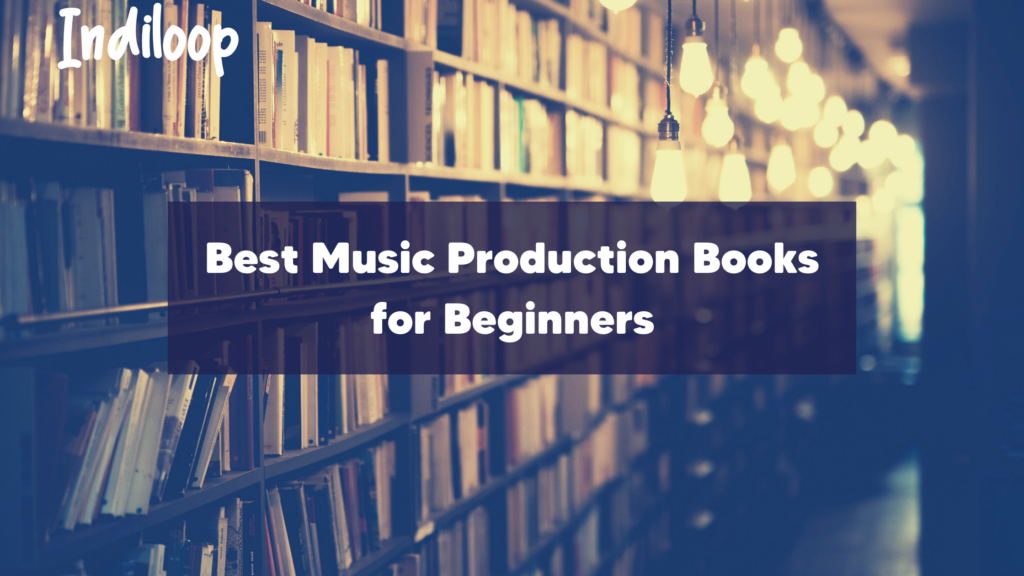
The best music production books for beginners are those that provide a comprehensive understanding of foundational concepts while also offering practical guidance for real-world application. Determining the “best” might hinge on various factors, such as the book’s coverage of fundamental techniques, clarity of explanations, or the credentials of the author. Essential topics to consider in these books include mixing, mastering, sound design, and music theory. Notable authors in the field, such as Bobby Owsinski and Rick Snoman, have penned influential guides that cater to novice producers. Furthermore, while many books are genre-agnostic, some cater specifically to genres like electronic music or hip-hop, showcasing the diverse landscape of music production literature. By prioritizing these criteria, beginners can find resources that effectively bridge the gap between theory and hands-on production, fostering a seamless entry into the world of music creation.
Best Beginner-Friendly Music Production Books
If you’re a novice in music production, these music production books can help you improve your production skills.
Mixing Secrets For The Small Studio – 2nd Edition
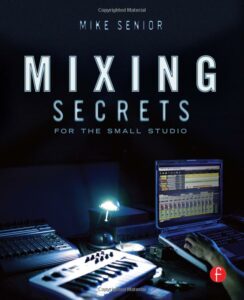
Title: Mixing Secrets For The Small Studio – 2nd Edition
Author: Mike Senior
Genre: Reference work
Originally Published: 2018
Description: The Mixing Secrets for the Small Studio is an audio production book for music producers looking to learn and understand the music production mixing process. Rather than curating a variety of music-mixing tips and tricks into a disorderly list, Mike Senior guides the reader through the stages of mixing songs, from beginning to end. The book is intended for music producers of all experience levels and is segmented into 4 main stages:
- Hearing and Listening – The root cause of most people’s problems with their mixes is not being able to hear what they need to or not knowing how to listen to what they’re hearing. Mike Senior discusses the importance of focusing on hearing and listening in the initial stages of mixing a song before trying to use any mixing technique. He also discusses using the right speakers and treating the acoustics of your room.
- Mix Preparation – The next stage of the music production mixing process Mike Senior mentions is mix preparation, which can oftentimes be ignored. Mike Senior explains how to do mix preparation properly within a small-studio context in an easy-to-understand way.
- Balance – The third stage Mike Senior mentions is finding balance in each audio track. This means making every important sound audible and at an appropriate level throughout the mix. A balanced mix is essential for the final product to be successful, as people will turn the music off if they cannot hear everything.
- “Sweetening to Taste” – The last stage in the mixing process is what Mike Senior calls “Sweetening to Taste”. What this means is adding effects to the recorded material to make the song more interesting to the listener. This step is the least important of all the steps, which is why the author puts it last.
Why this book is great for learning music production:
The Mixing Secrets for the Small Studio is great for learning music production because you get step-by-step instructions from an experienced audio engineer on how to mix any song effectively and without the need for fancy equipment.
Pros:
- Full of valuable information
- Actionable steps in chronological order
Cons:
- Even though it’s catered to most music producers, you will need a little bit of knowledge beforehand.
Art & Fear
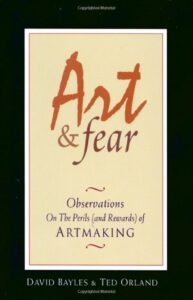
Title: Art & Fear
Author: David Bayles, Ted Orland
Genre: Self-help
Originally Published: 2001
Description: Art & Fear is a book that focuses less on the technical aspects of music production and more on the general creative processes and challenges artists face in making art. The book provides insight into the emotional and psychological journey of artists as they navigate self-doubt and uncertainty.
The authors emphasize the importance of making art you care about and advise against quitting, as quitting is permanent and art is about starting again and again. The book offers practical tips for artists, such as making friends with other artists and learning to think of the process of making art as the destination.
The authors also bring up the role of fear in the artmaking process and the importance of facing it in order to continue creating. Vision and execution are always in tension with music production, but that’s the way it should be. In other words, if things sound better in your head than when you create them in your DAW, that is normal and how it should be. This is because you have something to constantly work towards as you hone your craft. Being human means everything you make will not always be perfect, but continuing to create will lead to better development and great art over time.
Why this book is great for learning music production: Many books cover the technical aspects of music production but not enough books focus on the artistic aspect and the mindset of being a music producer. If you don’t have the right mindset, none of the technical aspects matter. Art & Fear does a great job of making sure you have the right mindset when creating music, ensuring longevity for aspiring music producers.
Pros:
- Provides valuable insights into what it’s like being an artist
- Gives readers actionable advice
- Engaging to read
Cons
- More of a general approach to art with no real focus on music production specifically
Steal Like an Artist
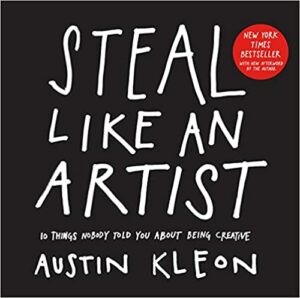
Title: Steal Like an Artist
Author: Austin Kleon
Genre: Self-help
Originally Published: 2012
Description: Steal Like an Artist by Austin Kleon is a fun book that talks about how to be creative. Austin emphasizes the point all creative work builds upon what has come before and there is no idea that is completely new. For music producers, this means being comfortable being influenced by other music producers, music genres, and other songs.
Why this book is great for learning music production: Many aspiring music producers get caught up in being “unique”. What this book explains is that you can create something unique without wasting time focusing on trying not to steal other people’s ideas. It’s ok to steal ideas in music production, as long as you add your personality and ideas to it. Austin also emphasizes being someone who collects ideas from all types of sources, so you can reference and use them later.
Pros:
- Very entertaining and easy to read
- For music producers looking for creativity, this book provides valuable insight into the creative process
Cons:
- Can be a bit unstructured to read as it’s focused on providing tips as opposed to giving you a step-by-step process. I personally don’t mind it but someone else might.
Music Theory for Computer Musicians
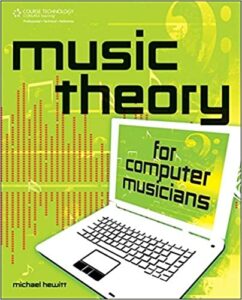
Title: Music Theory for Computer Musicians
Author: Michael Hewitt
Genre: Reference work
Originally Published: 2008
Description: Music Theory for Computer Musicians by Michael Hewitt is an information-rich book on the fundamentals of music theory. It contains all the major music theory concepts and is well-structured in terms of information. If you’re looking to learn concepts such as chords, melody and motives, harmonic and melodic minor scales, and diatonic modes, then this book is for you. Michael Hewitt also provides some historical context to some of the music theory concepts, allowing you to have a deep understanding of how music theory was used over time.
Why this book is great for learning music production: This book contains most of the music theory concepts a music producer should know to make engaging music. I love the fact that it comes with audio you can listen to to help with the learning process.
Pros:
- Great for music producers of all levels
- Able to reference the book whenever you need a reminder of a music theory concept
- Has quiz questions at the end of each chapter to test whether you retained the information
- Comes with audio tracks that reference the different music theory concepts
Cons:
- Not as engaging to read as some of the other books on this list
Making Music – 74 Creative Strategies for Electronic Music Producers
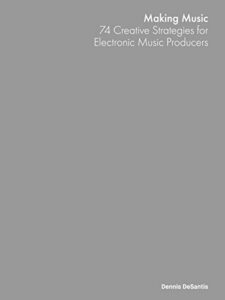
Title: Making Music – 74 Creative Strategies for Electronic Music Producers
Author: Dennis DeSantis
Genre: Reference Work
Originally Published: 2015
Description: Making Music – 74 Creative Strategies for Electronic Music Producers by Dennis DeSantis is a production book that provides techniques and strategies for music producers who are struggling with the music production process. The book is separated into three main sections:
- Problems beginning a song – If you are unable to come up with new music production ideas to start working on, this section provides tips on getting inspiration so that you can start. For example, one strategy mentioned is starting with the low end of the song. The low-end just refers to the bass and drums as this provides a foundation for the rest of your song.
- Problems progressing a song – This section contains strategies for expanding your song effectively so you are not dealing with the dreaded 8-bar loop that many music producers experience.
- Problems finishing a song – This section contains strategies for completing your song so that it sounds full and the arrangement is engaging and interesting.
Each section provides multiple problems and solutions, so you will be able to find the necessary information for the unique music production issues you are dealing with from a creative aspect.
Why this book is great for learning music production: The book is very straightforward with no “fluff”. When I say fluff, I am referring to excess information in the book that is not needed to understand the main points. There is so much valuable information for music producers on how to handle specific music production issues they are facing.
Pros:
- Structured very well in terms of being written in a problem-and-solution format
- Easy to read
- Unique and actionable information for most song production issues
Cons:
- Although the guide is great for all types of music producers, they use Ableton when displaying images for some music production concepts.
What Should You Consider When Choosing the Best Music Production Books?
When choosing the best music production book to learn from, there are a few factors you will want to consider:
Experience level: Some music production books are technical and intended for advanced music producers, while other books have basic-level information intended for beginner music producers. If you are looking to learn music production on your own, figure out your experience level with music production and find books that match your experience level.
Content: Choose a book that focuses on music production concepts you are trying to learn. This might include topics such as recording techniques, mixing and mastering, and music theory. You also want to make sure the content isn’t outdated. For example, certain books are evergreen, such as those relating to the creative process. However, books that are specific to music production technology may become outdated over time.
Writing style: The book’s writing style is worth considering as well. You might prefer a music production book written in an engaging style instead of an information-rich book that has a more formal writing style.
Reviews and ratings: Read reviews on the music books you are considering reading to make sure it’s worth purchasing.
Price: If you have a specific budget, be sure to get the music production books in your price range.